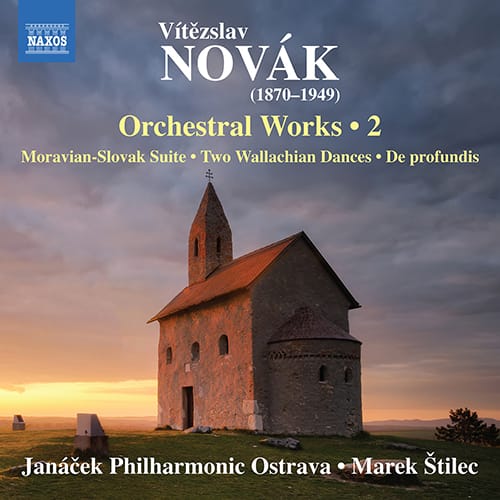De Profundis: Vitězslav Novák's orchestral music on Naxos
A fine disc, and required listening for all lovers of Czech music

Vitĕzslav Novák (1870-1949) was one an important Czech composers of the late 19th and early 20th centuries. I first encountered him via an excellent Chandos disc of Lady Godiva performed by the BBC Philharmonic (I wrote the official Amazon description for the first, full-price issue of that). His music is lushly expressive; he has an individual voice, identifiably Czech but very distinguishable from his far more famous contemporary, Antonín Dvořák.
The Moravian-Slovak Suite (it's title is Slovácká Suita, which means Slovak Suite) is one of his more popular works, and tells the story of a romance-felled day in a Slovakian village. The ever-reliable Marek Štilec conducts the Janáček Philharmonic Ostrava in superbly stylish performances - the Suite was originally written for piano in 1903 and was orchestrated by the composer later that year; the premiere came about in 1906 (Czech Philharmonic / Vilém Zemánek).
We met Štilec before.on Classical Explorer via music by Foerster and Wranitzky (here, here, here, and here). It is good to see him in Novák, too, if the performances are anything to go by.
Th suite opens in the morning, “At Church,” (V kostele), full of chorales, initially quiet and almost shimmering, later enhanced by organ (Pavel Svoboda, who gets his moment in the sun later in the disc). Štilec traces its development perfectly, the music rising naturally to a climax:
Children chatter unmistakably in the second movement, “Among the children” (Mězi dětni), the Ostravan players on the ball, sprightly.
Romance blossoms in “The Lovers” (Samilovani), an explosion of loveliness:
. while “The Ball” (U muziky) presents a succession of charming rustic dances. The finale, “At Night” (V noci) balances the first in length but describes a nocturnal/crepuscilar scene of great beauty. Novák scores beautifully:
Incidentally, if you follow this YouTube link, it takes you to Czech pianist Radoslav Kvapil's disc on the Alto label of Novák piano music, including the original piano version of the full Suite.
The Two Wallachian Dances, Op. 34 of 1904 (heard I their 1906 version for orchestra) comprise a “Troják” and a “Dymák” - the original set held three dances for piano duet. Two ended up for solo piano, then for orchestra. They receive their premiere recording here - they were rediscovered by Štilec. There is no missing the folk content here, and how the Janáček Philharmonic players revel in the first. It's only 4"46 long but this is a distinctly symphonic canvas:
The second, “Dymák,”is more lively (we move from “Allegro ben titmice” to “Con fuoco”) and the Ostravans have a real ball of a time. Lovers of Dvořák's Slavonic Dances will enjoy this, for sure, and there's a similar sound, too, with a prevalence of pointed woodwind tunes. The very end is worth waiting for, with its little washes of harp:
Finally, something a little different. From folk music and a sweet depiction of a day in the country, to De profundis, Op. 47 (1941) - a gap of 35 years. This is the last of Novák's symphonic poems, written during World War II, and it includes a significant part for organ (Pavel Svoboda). “Out of the depths I have cried” goes the text of Psalm 130, and indeed the music emerges exactly from those deep spaces, the lowest instruments of the orchestra. Almost Modernist in effect, we are in a very different world from the first two pieces on the disc. The path to the climax is long and emotionally arduous; all credit to Štilec not only for tracing it perfectly, but also for not allowing the textures to saturate at the moment of climax itself. To me, this is the most significant pievce on this disc. The organ is perfectly integrated into the argument, and Svoboda is a fine player. Think Saint-Saëns' Organ Symphony in terms of apotheosis, but with a Czech rather than a French accent:
A fine disc, and required listening for all lovers of Czech music.


